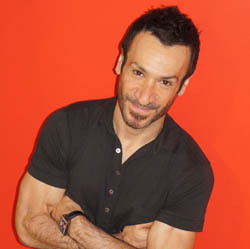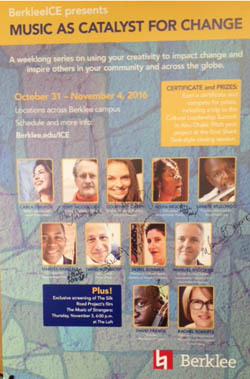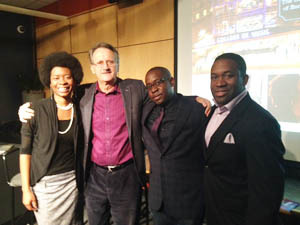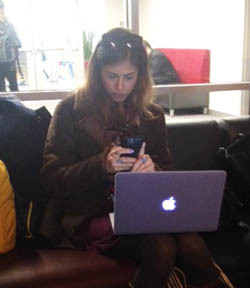I have just spent the most amazing week in the company of some of the most creative, innovative, disruptive, and collaborative people I could have imagined. The experience has left me feeling reflective, energized, and, above all, optimistic about the direction of the world.
 So let me back up a bit here and give you some background starting with an introduction to a new friend and colleague. I first met Panos Panay (in photo right) about two years ago, just as he was returning to his alma mater, Berklee College of Music in Boston. Since graduating, he had become a very successful entrepreneur (he was the founder of Sonicbids) and was coming back to begin a brand new program at the invitation of the College's President, Roger Brown. He would become the founding Managing Director of the Institute of Creative Entrepreneurship (ICE).
So let me back up a bit here and give you some background starting with an introduction to a new friend and colleague. I first met Panos Panay (in photo right) about two years ago, just as he was returning to his alma mater, Berklee College of Music in Boston. Since graduating, he had become a very successful entrepreneur (he was the founder of Sonicbids) and was coming back to begin a brand new program at the invitation of the College's President, Roger Brown. He would become the founding Managing Director of the Institute of Creative Entrepreneurship (ICE).
Panos exhibits one of the highest energy levels I have ever come across in a human being. He is what I would describe as an enquiring creative disruptor who challenges the orthodox and yet manages to steer a course towards collaboration, innovation and discovery. In a very short period of time he has established ICE as a program that redefines the role of musician and places entrepreneurship at the center of career development. He facilitates these goals through developed collaborations and partnerships with MIT, and IDEO, as well as work with other major educational institutions from Babson to Harvard. His program provides internships in the music business, online learning, the opportunity to meet and hear some of the finest thinkers and leaders in the field, study tours to places like Silicon Valley, as well as incubator projects that allow young artists to think through their own start up and become agents of their own development.
Take a look at some of Berklee's online introductory videos and you will get a clear sense of Panos' passionate conviction that students need to elevate their ambition and aspire to the highest goals.
The first time I met him I took to him immediately and since then we have spent many hours discussing ideas and the place of music in the world. Last March he invited me to be part of a panel talking about music and social entrepreneurship and it was there that I met for the first time fellow panelist Carla Dirlikov Canales, an opera singer 10 years into a blossoming international career who already has established her own nonprofit and for-profit dedicated to new thinking about music and culture.
 This serendipitous gathering began a discussion and finally an invitation from Panos for Carla and me to become the co-artistic directors of a weeklong residency at Berklee called "Music as Catalyst for Change." It's a provocative title and it involved us in a huge amount of research and brainstorming that allowed us to shape the residency. I say "shape" because the week was designed in such as way that it was responsive and flexible to the needs of the attending students rather than a rigid structure with imposed syllabus.
This serendipitous gathering began a discussion and finally an invitation from Panos for Carla and me to become the co-artistic directors of a weeklong residency at Berklee called "Music as Catalyst for Change." It's a provocative title and it involved us in a huge amount of research and brainstorming that allowed us to shape the residency. I say "shape" because the week was designed in such as way that it was responsive and flexible to the needs of the attending students rather than a rigid structure with imposed syllabus.
As someone who loves structure, I had to breathe very deeply at the seemingly improvisatory quality of this format and yet I have to say that it was one of the most liberating and creative experiences that has ever come my way.
This was the declared basic objective the students received for the week:
Your challenge over the next five days will be to take your idea of a better world, your passion for change, your spark of a project from concept to reality. Soak in inspiration from the guest speakers, learn from their failures and successes, tap into the on-campus coaching and imagine how the arts might be used to positively impact your community, your home, your country, or even the world.
I thought this was pretty impressive. From it emerged two themes to the teaching and learning on offer: inspiration and practical advice.  The inspiration was provided by some really great guest speakers who came and told their story about the power of music and its new and innovatory uses in the widest social contexts. They included people like the Ugandan musician Samite Mulando who found a place in everyone's heart through his experiences as a humanitarian in Africa; Courtney Casey the Artistic Administrator of National Sawdust, which is redefining what it means to be a performing arts organization in the C21; and three founding directors of Sistema-inspired developments in this country--David France of Revolution of Hope in Boston, and Dantes Rameau and Aisha Moody from the Atlanta Music Project. Theirs were really sweeping experiences that anyone interested in social entrepreneurship would find fascinating and inspirational. (in photo L to R: Aisha Moody, the author, David France, Dantes Rameau)
The inspiration was provided by some really great guest speakers who came and told their story about the power of music and its new and innovatory uses in the widest social contexts. They included people like the Ugandan musician Samite Mulando who found a place in everyone's heart through his experiences as a humanitarian in Africa; Courtney Casey the Artistic Administrator of National Sawdust, which is redefining what it means to be a performing arts organization in the C21; and three founding directors of Sistema-inspired developments in this country--David France of Revolution of Hope in Boston, and Dantes Rameau and Aisha Moody from the Atlanta Music Project. Theirs were really sweeping experiences that anyone interested in social entrepreneurship would find fascinating and inspirational. (in photo L to R: Aisha Moody, the author, David France, Dantes Rameau)
 The practical advice came from, amongst others, David Rothkopf, the CEO of the Foreign Policy Group, and Rachel Roberts and her Entrepreneurship team from New England Conservatory. Carla (in photo right) and I were available to the students in and around the scheduled sessions and they seemed to seek us out in large numbers to discuss ideas and concepts and advice about the best way forward for their projects and presentations.
The practical advice came from, amongst others, David Rothkopf, the CEO of the Foreign Policy Group, and Rachel Roberts and her Entrepreneurship team from New England Conservatory. Carla (in photo right) and I were available to the students in and around the scheduled sessions and they seemed to seek us out in large numbers to discuss ideas and concepts and advice about the best way forward for their projects and presentations.
These presentations were the culmination of the week and were delivered in Shark Tank format. But before the Shark Tank, there was a Hackathon, another first for me! The Hackathon proved to be a working session for the students to try out ideas with various advisers and their peers and to exchange information and experiences. It was serious fun and I think gave the students some really great feedback. This led to the Shark Tank the next day, during which students were given not more than three minutes to present their projects and then face a battery of questions and more advice from the panel.
The panel comprising Carla, Panos, David Rothkopt, Rachel Roberts and me never really discussed the criteria to be used for the assessment of the projects so I invented my own--giving credit for how well a plan resonated with the theme of the week, the project's potential viability, the effectiveness of the presentation, the definition of the need and opportunity, and then the details of the plan and its outcomes. All of which seemed to work and also seemed to be what everyone else was thinking as well.
The presenters needed to be really disciplined in their thinking to cover all that in just three minutes. Panos hated the idea of calling this session Shark Tank but I must say I thought it was a great format and the students really responded to the whole challenge. There were 11 presentations in total on projects that included linking Ghanaian Music and Healthcare; re-imagining disaster relief fund-raising events to be more pro-active than responsive; dealing with negative attitudes towards asylum seekers; integrating music and technology, and music and medicine. Every student who presented deserved a prize and the very best received major internship opportunities through Carla's nonprofit and my offer of one on one coaching.
I really loved the students' approach to the assignment, their thinking and intuitive sense of innovation. I was also delighted to see how diverse and international the student group was.
This morning over a coffee contemplating my flight back to Europe I found that I missed everyone and that I also could not quite understand how the whole thing had come together and developed into such a wonderful success. Maybe it was the project's manager, Nicole d'Avis, who flew around, almost literally, making it all work, or the loose flexible structure, or the students and their receptivity, or the brilliant guests and their stories and expertise. Then I decided not to analyze it but to bathe in the light of the project, which for just five days illuminated what can be done when orthodoxy is thrown to the winds and creative disruption takes over. Maybe it was all contained in the phrase that appeared in our discussions nearly every day when discussing a project or an idea: "Why not?"